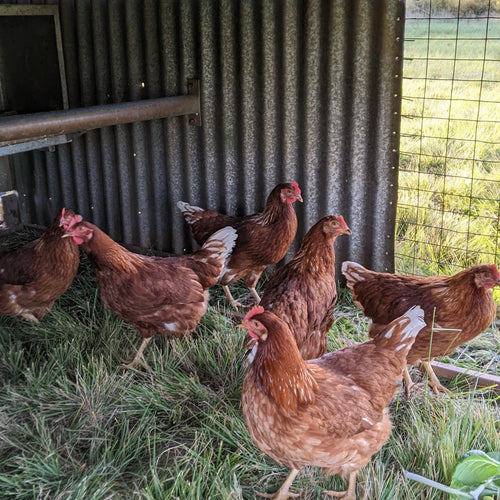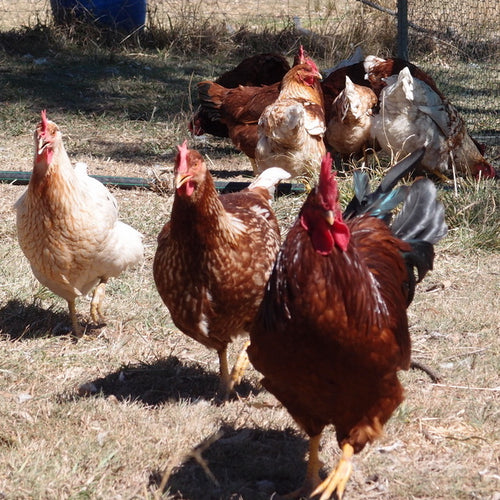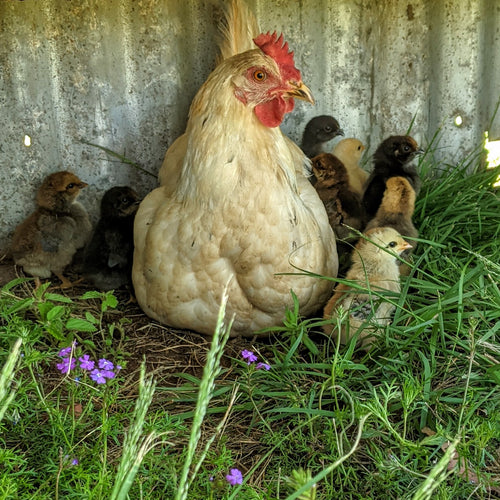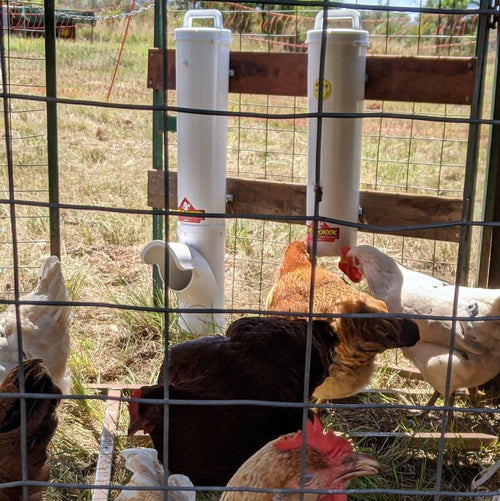Meal worms for chickens
One of our goals is to set up our farm to be self-sufficient, mainly because that the cheapest way to do things, and also because it means that we don't have to rely on external sources to provide what we need. A weak point is the chickens. Even though they provide us with plenty of tasty eggs and meat, we still have to buy grain to feed them, so that's not exactly a self-sufficient system. I've been on the lookout for ideas for food that we can grow for the chickens to at least replace part of the grain we but for them.
One thing that does make a difference is allowing the chickens to free-range, they eat far less grain. I wrote a while ago about feeding the chickens only corn and sunflower seeds. Since then I've read more about chicken nutrition, as it seems that they do need meat, or at least the amino acid methionine, as it is not found in significant proportions in grains or legumes. The theory is that chickens are descended from naturally free-ranging jungle-dwelling birds (gallus gallus), which tend to get their protein from bugs. It is argued (and I read this in a magazine on small farming, so I can't link to the article) that a chicken free-ranging on pasture does not pick up as many bugs as a jungle bird might, and therefore does not get enough protein from bugs, and so needs to be fed a "complete ration" containing either meat meal or a synthetic form of methionine.
Chicken pellets are usually labelled as complete rations, and if they contain meat meal, they will have a warning not to feed to ruminants (trying telling our house cow not to eat the chicken feed!). I would still prefer to feed grain, as you at least know exactly what's in the feed. I'm not sure if our free-ranging chickens are getting enough protein from the bugs they find. They certainly lay more eggs when we feed them high-protein layer pellets, so maybe they do need more.
With this in mind, when a friend offered me her excess mealworms, so that I could start breeding them, it seemed like the perfect way to make sure that the chickens had enough bugs in their diet to meet their methionine needs, and we could continue to feed them on corn and sunflower seeds, and look for other feed that we could grow to even replace the grain eventually, and still get lots of delicious eggs and chicken meat for ourselves.
Have you tried farming meal worms? Any tips? What else do you grow to feed your chickens to increase your self-sufficiency?
| a couple of hens tasting the mealworms |
Chicken pellets are usually labelled as complete rations, and if they contain meat meal, they will have a warning not to feed to ruminants (trying telling our house cow not to eat the chicken feed!). I would still prefer to feed grain, as you at least know exactly what's in the feed. I'm not sure if our free-ranging chickens are getting enough protein from the bugs they find. They certainly lay more eggs when we feed them high-protein layer pellets, so maybe they do need more.
With this in mind, when a friend offered me her excess mealworms, so that I could start breeding them, it seemed like the perfect way to make sure that the chickens had enough bugs in their diet to meet their methionine needs, and we could continue to feed them on corn and sunflower seeds, and look for other feed that we could grow to even replace the grain eventually, and still get lots of delicious eggs and chicken meat for ourselves.
So far the meal worms have been very easy to grow. They live on grain, which I realise is ironic because the whole point of this exercise was to reduce the grain consumption, but the point is that the meal worms convert that grain to higher protein feed just by feeding and growing, so its a way to increase the nutritional value of the grain and they don't seem to use much grain at all. They also need the occasional carrot or apple to provide moisture, just replace it when its all eaten or gone mouldy. I keep the meal worms in a plastic tub next to my worm farm. They have a piece of cardboard on top of the grain and then the tub is covered in a hessian sack for good air flow. This all seems to suit them fine as they are breeding like mad! The most effort is required in remembering to harvest a few worms each day and take them to the chickens, I'm sure that the chickens will learn that I bring them worms after a while and come running. I am trying to think of how to let the chickens self-harvest, but without eating all the bugs.
| the meal worms all tucked up under a hessian sack |
Have you tried farming meal worms? Any tips? What else do you grow to feed your chickens to increase your self-sufficiency?























Leave a comment